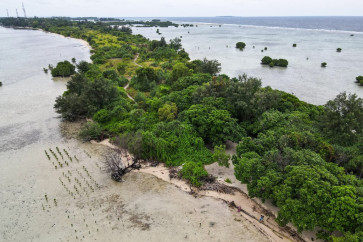Discourse: RI now has firm foreign policy standpoint, says Retno
President Joko âJokowiâ Widodo has wrapped up his nine-day overseas trip, attending the APEC Summit in Beijing, the ASEAN and East Asia summits in Naypyitaw and the G20 Summit in Brisbane, Australia
Change Size

P
em>President Joko 'Jokowi' Widodo has wrapped up his nine-day overseas trip, attending the APEC Summit in Beijing, the ASEAN and East Asia summits in Naypyitaw and the G20 Summit in Brisbane, Australia. The President has set a new course for Indonesia's diplomacy through his so-called maritime-axis vision and has secured many commitments from world leaders to participate in the development of the country's infrastructure. The Jakarta Post's Rendi A. Witular recently talked to Foreign Minister Retno LP Marsudi on how Indonesia should follow up on the trip's achievements. Here are excerpts of the interview:
Question: What accomplishments can the President bring home from this nine-day overseas trip?
Answer: There are a lot of deliverables that we can follow up on. It was the first appearance of Pak Jokowi as Indonesia's new president and he delivered his vision to the world. After these three summits, the world will understand where Indonesia is heading and what Indonesia wants for the next five years under the new administration.
Among the talked-about subjects has been the President's maritime-axis doctrine, including infrastructure development, one of the doctrine's five pillars. The infrastructure pillar is where we need a lot of follow up. Japan and China, for example, offered a working group particularly to handle the follow-up. All meetings with the leaders, including the recent one with (Australian) Prime Minister Tony Abbott, covered discussions on the maritime sector and infrastructure development. Details of the meeting will be pooled and the President usually demands ministers to immediately make progress on the follow-ups.
Are there any issues that need to be immediately followed up?
We need to see all the priorities. For example, the President has talked about the construction of 24 ports. We will propose projects for other countries to participate in the development. The Office of the Coordinating Economic Minister and the Office of the Coordinating Maritime Affairs Minister will coordinate on the follow-up. My ministry will work closely with them to communicate with the outside world. The beauty of this Cabinet is that since the beginning the President has required us all to drop any sectorial ego for us to communicate better.
ASEAN members lack unity when confronting China in the South China Sea (SCS) border dispute. As a non-claimant state, how will Indonesia lead ASEAN in a bid to expand the group's bargaining power?
During the East Asia Summit (EAS), the President presented his maritime vision that pointed to the belief that the concept was not an isolated one. Indonesia will not be a closed nation. The maritime vision will enable us to provide connectivity in the region. The issues related to the SCS are also covered in the maritime concept.
Indonesia was at the forefront in developing the declaration of conduct (DoC). We will ensure that there is progress in the DoC. The border claims should be resolved by the respective countries, but what Indonesia wants is that we should all prioritize settlement on a peaceful basis to maintain stability in the region. We cannot afford to have a region that is insecure for economic development.
How will Indonesia accelerate the conclusion of the code of conduct (CoC)? The CoC is a binding instrument to help prevent military conflict between China and several ASEAN members in the dispute over the resource-rich SCS.
Definite progress is about assuring the conflicting parties. Now we are discussing the 'early harvest' that we can deliver, such as the CoC on sea accidents and special communication lines. At the least, all efforts that require immediate handling should be approved and this could be a major contribution to how the parties engage in the SCS. I don't know the timetable for the completion of the early harvest.
Will the maritime-axis doctrine poses a challenge to Indonesia's 'free and active' diplomatic doctrine?
I don't think it will alter the doctrine. I would like to convey my message that this is us, Indonesia, we will not lean to any side. What differentiates us now is that we will become more definitive in our demands.
In the past, our difficulty was when we rejected an idea we could not come up with a definitive answer. Our counterparts usually asked what Indonesia actually wanted after opposing the given options. It seemed Indonesia could not make up its mind.
But now, from the very beginning we are able to deliver a message of what Indonesia is demanding. Before other countries question Indonesia's view, we have already provided them with our stance ' the maritime doctrine.









